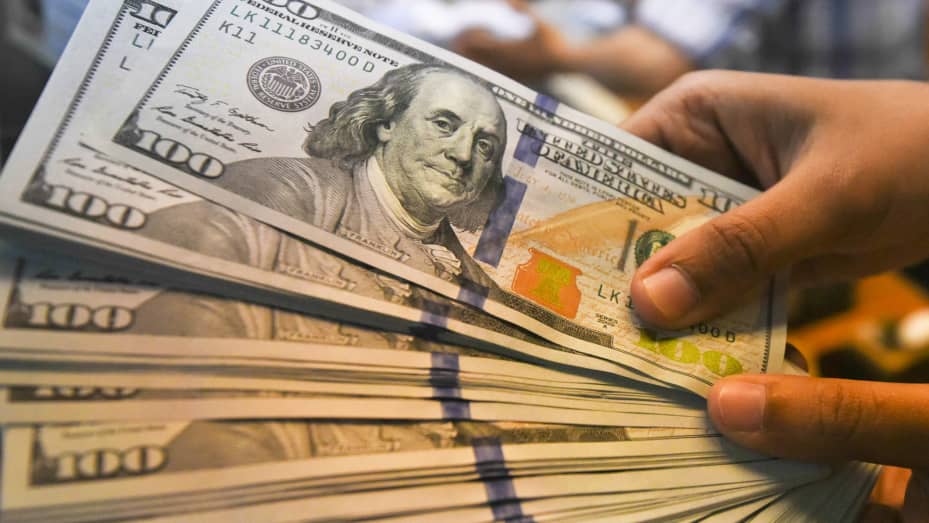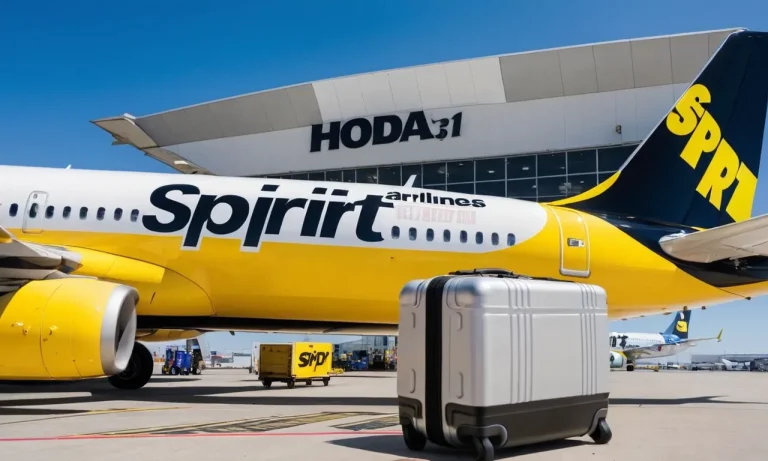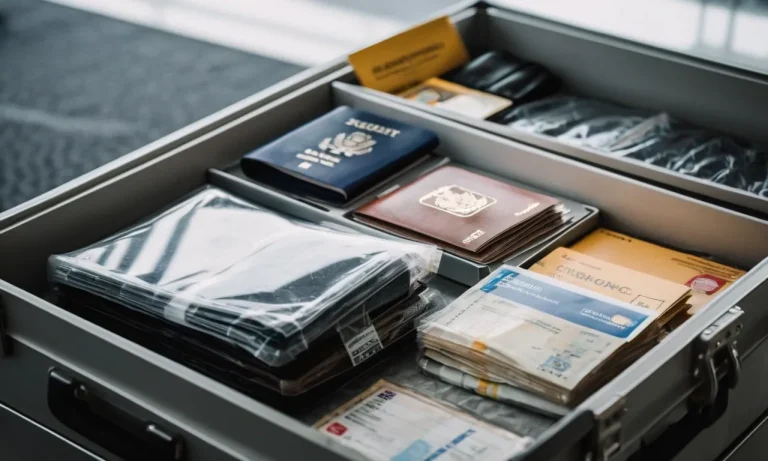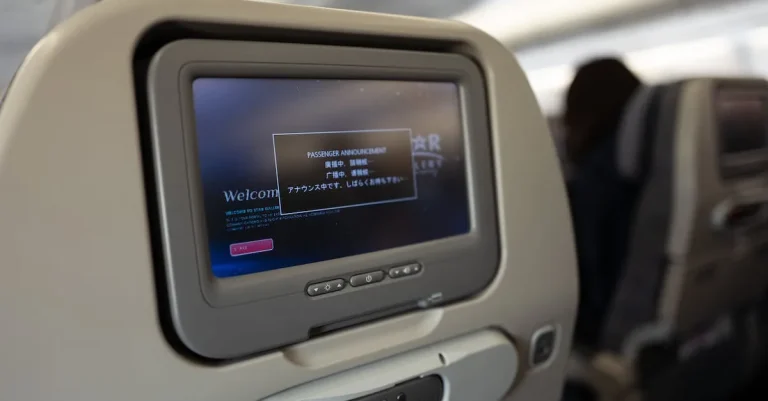Traveling internationally with large sums of cash can lead to headaches at customs.
If you’re carrying more than $10,000 in U.S. currency or monetary instruments into or out of the United States, you need to make a declaration to avoid potential penalties.
If you’re short on time, here’s a quick answer:
In this comprehensive guide, we’ll explain everything you need to know about declaring over $10,000 cash when entering the U.S., including the declaration requirements and process, consequences for not declaring, exceptions, and tips for hassle-free travel.
Declaration Requirements
What Counts Toward the $10,000 Threshold
When entering the United States, it is important to understand the declaration requirements for cash amounts exceeding $10,000.
This includes not only physical cash but also monetary instruments such as traveler’s checks, money orders, and negotiable instruments.
It is crucial to note that the $10,000 threshold applies to both U.S. currency and foreign equivalents.
So, if you are carrying $5,000 in U.S. dollars and an additional €6,000 in euros, the total would exceed the threshold and must be declared.
When and How to Declare
Travelers must declare any amount exceeding $10,000 to U.S. Customs and Border Protection (CBP) when entering or leaving the country.
This declaration must be made on the appropriate form, known as the FinCEN Form 105, Report of International Transportation of Currency or Monetary Instruments (CMIR).
This form can be obtained from CBP officers or downloaded from their official website. It is essential to complete the form accurately and truthfully to avoid potential legal consequences.
💡 Tip: It is always better to err on the side of caution and declare any amount close to or exceeding $10,000 to avoid any complications or penalties.
Declaring the amount can be done verbally or in writing, depending on the mode of transportation. For instance, if you are entering the U.S. by air, you will typically fill out the form electronically during your flight.
However, if you are arriving by land or sea, you may need to present the completed form to a CBP officer upon arrival.
🔍 Related Statistic: According to CBP data, in 2019, over 14,000 individuals declared amounts exceeding $10,000 upon entering the United States.
Remember that failure to declare amounts over $10,000 can result in severe consequences, including fines, asset seizure, and even criminal charges.
It is crucial to comply with the declaration requirements and be aware of any updates or changes in the regulations.
Consequences of Not Declaring
Civil Penalties
Failure to declare more than $10,000 in cash when entering the U.S. can result in serious consequences. One of the most common penalties is the imposition of civil fines.
The U.S. Customs and Border Protection (CBP) has the authority to assess fines for non-compliance with currency reporting requirements.
These fines can range from a few thousand dollars to the entire amount of money that was not declared. In some cases, individuals may even face penalties up to 50% of the total amount being transported.
Criminal Charges
Not declaring more than $10,000 in cash can also lead to criminal charges. Intentionally failing to report large amounts of currency is considered a federal offense under the United States Code.
Individuals may face charges of smuggling or structuring, depending on the circumstances.
Smuggling involves intentionally concealing the cash to avoid detection, while structuring involves intentionally depositing or withdrawing amounts of money in a way that avoids federal reporting requirements.
Both offenses can carry severe penalties, including imprisonment and substantial fines.
Seizure of Funds
In addition to civil penalties and criminal charges, individuals who fail to declare more than $10,000 in cash may also have their funds seized by the government.
The CBP has the authority to seize any currency or monetary instruments that are not properly declared.
Once seized, individuals must go through a legal process to try and recover their funds. However, this process can be lengthy and complex, and there is no guarantee of success.
It is important to note that even if the funds are eventually returned, there may be significant legal fees and other expenses associated with the seizure.
It is crucial to understand and comply with the currency reporting requirements when entering the U.S. The consequences of not declaring large amounts of cash can be severe, resulting in civil penalties, criminal charges, and the seizure of funds.
To avoid these consequences, individuals should always be transparent about the amount of money they are carrying and follow the necessary procedures set forth by the CBP.

Exceptions and Special Rules
While declaring more than $10,000 in cash when entering the U.S. is generally required, there are certain exceptions and special rules that apply to specific groups of individuals.
These exceptions are designed to accommodate unique circumstances and ensure a smooth entry process.
Let’s take a closer look at some of these exceptions:
Ship Crewmembers
Ship crewmembers, including pilots and flight attendants, are often exempt from the requirement to declare cash amounts exceeding $10,000.
This exception recognizes that crewmembers frequently travel with large sums of money for their work-related needs, such as paying for expenses during layovers or purchasing supplies abroad.
However, it’s important to note that this exemption only applies to crewmembers actively engaged in their professional duties.
Passengers on Small Pleasure Boats
If you’re entering the U.S. on a small pleasure boat, such as a personal yacht or sailboat, there are different rules that apply.
While the $10,000 declaration threshold still stands, passengers on small pleasure boats may have additional flexibility in how they declare their cash.
For example, they may be allowed to declare the cash to the captain or another designated crewmember, rather than directly to U.S. Customs and Border Protection (CBP) officers.
This streamlined process helps facilitate the entry process for recreational boaters.
Foreign Diplomats
Foreign diplomats, including embassy staff and consular officials, are also subject to different rules when it comes to declaring cash amounts exceeding $10,000.
These individuals are typically covered by diplomatic immunity, which grants them certain privileges and exemptions.
However, they are still required to declare any cash they are carrying, but the process may be handled differently due to their diplomatic status.
It’s recommended for foreign diplomats to consult with their respective embassies or consulates for specific guidance on cash declarations.
Remember, these exceptions and special rules exist to accommodate specific circumstances and ensure a smooth entry process.
It’s always important to consult official government sources or seek professional advice if you have any questions or concerns regarding cash declarations when entering the U.S.
Tips for Hassle-Free Travel
Carry Supporting Documentation
When traveling with a large amount of cash, it is important to carry supporting documentation to avoid any unnecessary hassle.
This can include bank statements, withdrawal receipts, or any other documents that prove the source of your funds.
By having these documents readily available, you can provide evidence to customs officials if they question the amount of cash you are carrying.
It is always better to be prepared and have the necessary documentation on hand.
Know Your Rights and Obligations
Before traveling with a significant amount of cash, it is crucial to familiarize yourself with the rights and obligations associated with declaring money when entering the U.S.
Each country has its own laws and regulations regarding the amount of cash that can be brought in without declaration.
By understanding these rules, you can avoid any legal issues or penalties. Additionally, knowing your rights will help you navigate any potential interactions with customs officials more confidently.
Consider Alternatives to Cash
If you are concerned about the hassle of declaring large amounts of cash when entering the U.S., it may be worth considering alternative payment methods.
Nowadays, there are various options available such as traveler’s checks, prepaid debit cards, or wire transfers.
These alternatives provide a secure and convenient way to carry funds without the need for extensive declarations.
However, it is important to research and understand any potential fees or limitations associated with these alternatives.
Conclusion
Declaring currency over $10,000 when entering the U.S. is mandatory, not optional. Take the requirement seriously to avoid penalties.
But armed with the right knowledge, you can navigate the process smoothly.
The bottom line: Always properly declare if you’re carrying over $10,000 in cash or monetary instruments. Be ready to provide supporting documentation. And consider safer alternatives to traveling with large cash sums.






